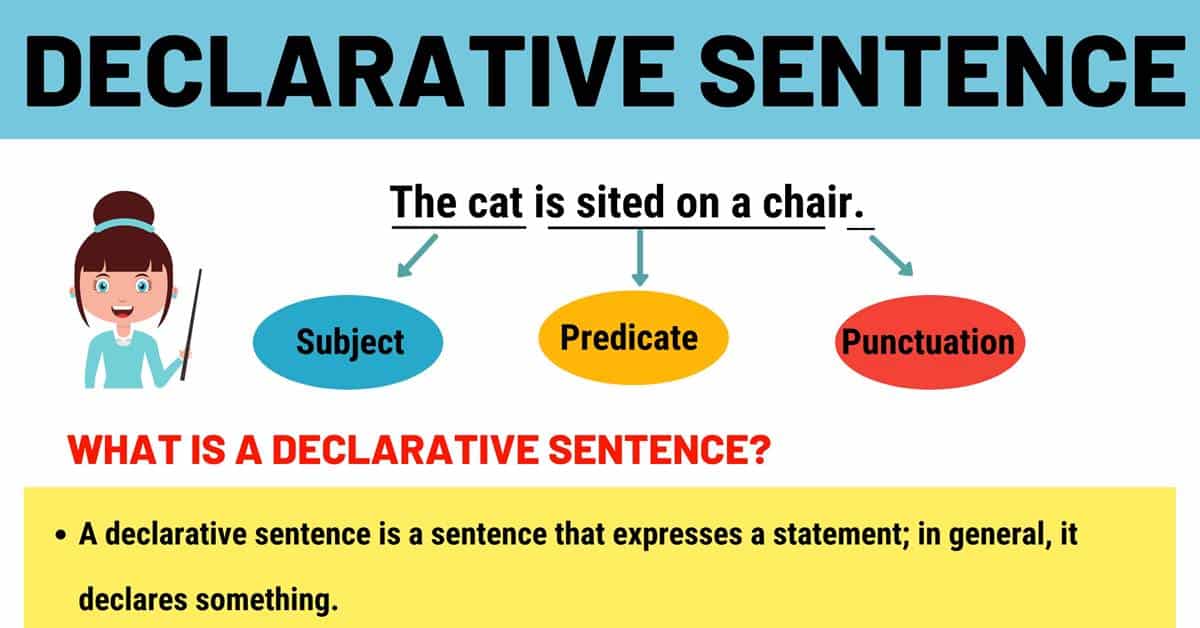Declarative sentence in English grammar. Here you will find the definition, different types of declarative sentences and useful examples in English.
Declarative Sentence
Declarative Sentence Definition
A declarative sentence is a sentence that expresses a statement; in general, it declares something. This type of sentence is used to convey a message, for instance, expressing your opinion or view about a particular point. It is the most common of all the four types of sentences.
The main aim of communication is to share information among the target audience. Communication allows us to share our views, thoughts, opinions, plans, answer questions, and even tell other people about our desires. Declarative sentences end with a full stop, unlike other types of sentences that may end with an exclamation mark or a question mark.
Elements of a Declarative Sentence
The elements of a declarative sentence are not different from that of other sentences: it contains a subject and a predicate.
Subject
A subject is the main message contained in a sentence. It can either be a noun or a pronoun and in a declarative sentence, it comes before the main clause.
Predicate
A predicate is composed of a verb and any other information contained in a sentence or clause.
Subject and predicate examples in a sentence:
- The cat is sited on a chair
Here the subject is “dog,” and the predicate is “is sited on a chair.”
- Preparedness does away with anxiety when taking a test
Here the subject is “preparedness,” and the predicate is “does away with anxiety when taking a test.”
Punctuation
Punctuation is what differentiates a declarative sentence from other types of sentences. Declarative sentences end with a full stop, also known as a period.
Type of Declarative Sentences
Declarative sentences are always in the present tense and convey a direct message. They can be simple or complex (compound). A simple sentence is composed of a subject and a predicate.
Simple Declaretive Sentences
Examples of simple declarative sentences:
- He plays.
- She laughs.
- The motorbike is grey.
- James is happy.
- He is four years old.
- He loves music.
- Donkeys are friendly.
Compound Declarative Sentences
A compound declarative sentence uses a comma and a conjunction to join two phrases that are related. Also, the phrases can be linked together with a semicolon, in the presence or absence of a transition word such as, therefore, besides, however, among others.
Examples of compound declarative sentences:
- He wanted to visit her grandmother, but she wanted to visit her aunt.
- Jason wants to do well in his studies, yet he doesn’t work hard.
- Demonstrations lasted for two days; the town was under siege.
Declarative Sentence Examples
Declarative sentences range from simple to more complex sentences. It is important to note that all declarative sentences end in a full stop and are enlightening statements. They can also be used to express an opinion.
- It is a good day.
- She loves listening to music; he dislikes watching movies.
- My laptop is missing.
- James is unwell; therefore, she is absent from school today.
- The vegetables are greener after the rain.
- His motorbike was brand new, and now it is missing.
- My mum loves to dance, but my father prefers to listen to music instead.
- The chief is in the midst of an important meeting.
- My new skirt has black and white stripes.
- My friends are heading to Australia for a vacation, and I am joining them there afterwards.
Declarative Sentence Infographic









0 Comments